Supercharging the Mind:
A Complete Guide to Improving Brain Function and Neural Regeneration With Foods and Herbs
BY MARIA NOEL GROVES
 in order to improve brain function, memory and stimulate neural regeneration, you must nourish the brain with proper foods, nutrition and herbs.
in order to improve brain function, memory and stimulate neural regeneration, you must nourish the brain with proper foods, nutrition and herbs.
Your brain serves as the primary control center for your body. It’s the original portable computer: weighing in at just a few pounds (a small percentage of your total body weight), it contains 100,000 miles
of blood vessels and 1 quadrillion neurons, and it consumes 25 percent of your body’s oxygen and nutrients and 70 percent of its glucose (the brain’s preferred fuel). But what’s really amazing about your brain is that it’s what makes you human. Alongside all the complex calculations and overview of all body functions, your brain is an electric neural forest rich with memories, emotions, dreams, and desires. It controls how you see the world, taste your food, hear music, smell aromas, and absorb the wonders of the world around you. So much of your identity stems from your brain function and how it works.It’s easy to take your brain for granted, until it starts to falter: flighty attention, difficulty remembering names and where you left the keys, or the inability to perform cognitive tasks for work and play. Your neural forest ecosystem begins to degrade into a jumble of tangles that interfere with data transmission. Problems with memory and cognition come in many forms and for many reasons, from chronic or acute stress to brain trauma or aging. As you age, the health and functioning of your brain becomes a greater priority, especially if dementia or Alzheimer’s runs in the family. But whether you’re 20 or 90, it’s never too early or too late to start tending your neural forest and taking simple steps to improve your brain function.
Jumping from Synapse to Synapse
Memory and cognition are functions of the brains neural network, the web of neurons (nerve cells) that make up the brain and innervate the body. Like Tarzan swinging across the jungle from tree to tree, neural signals fly through your brain and body via electrical impulses that jump across gaps (synapses) between one neuron and another. They’re lightning fast! One nerve impulse can travel at a rate of up to 100 yards a second.
As their name would imply, neurotransmitters are the substances responsible for transmitting these electrical impulses across the neural synapses and largely facilitating brain function. When their job is done, enzymes (their names often end in -ase) or neurotransmitter transporters (a type of protein) break down the neurotransmitters. Reuptake inhibitors—including the well-known antidepressant selective serotonin reuptake inhibitors (SSRIs)—inhibit the breakdown of specific neurotransmitters so that more of those neurotransmitters will be present in the body.
Neurotransmitters do a wide range of things, and an excess or deficiency of them plays a role in many different diseases. Acetylcholine (ACh) is a major transmitter for basic body functions, including contraction and control of muscles and involuntary actions. Low ACh levels are associated with Alzheimer’s, and many of our mint-family brain-boosting herbs (sage, rosemary, lemon balm, mint) boost Ache levels by inhibiting the enzyme that breaks it down, in the process improving brain function. Other cognition- and mood-related neurotransmitters include adrenaline, norepinephrine, dopamine, GABA, serotonin, glutamate, and endorphins. In this article, we’ll key on the neurotransmitters that contribute to cognition and memory, and the things that you can do to naturally improve brain function and protect these critical areas of the brain.
The Foundations of Thriving Brain Health: Diet, Lifestyle and Mind-Body Balance
In my book Body Into Balance: An Herbal Guide to Holistic Self-Care we talked about diet, lifestyle, and mind-body balance as the foundations of health, vitality, and well-being, and these topics have come up repeatedly in terms of their importance for each of the body’s major systems. Well, here they are again. These three factors play a major role in the overall health and functioning of the brain, and in particular memory and cognition. There are, of course, herbs, remedies, and pharmaceuticals you can take that combat oxidation, enhance circulation, reduce inflammation, and boost mood, all of which will improve brain function and support good memory and cognition, but without a healthy diet, lifestyle, and mind, these remedies will tend to address symptoms, not the core problems. So begin your journey toward a better-functioning brain here, with the following guidelines.
Diet
Remember that the food you eat provides your body with the raw materials it needs to make cell and nerve linings, neurotransmitters, enzymes, fuel, and more. Therefore, what you eat plays a significant role in improving brain function. A poor diet gums up the works, while a healthy diet gives your brain and nervous system exactly what they need to thrive.
High-Quality Fats
As much as 60 percent of your brain is made of fat, and the myelin sheath that protects nerve endings is also primarily fat. Add this to the fact that the lining of all your cells includes fatty acids, and you see that being a “fathead” isn’t an insult, it’s a reality!
The types of fat available for use by the body to construct and cushion all of this come primarily from your diet. Quality counts! Load up on omega-3 and monounsaturated fat-rich brain foods, including cold-water wild fatty fish, olive oil, avocados, nuts, and seeds. A diet rich in these fats is associated with a 40 percent reduced risk of Alzheimer’s and dementia, better brain volume, improved performance on memory and reasoning tests, and reduced levels of beta-amyloid plaque (which hinders nerves and brain function). Low levels of omega-3 fatty acids are associated with reduced brain function and shrinkage, memory loss, declines in cognitive function, and a greater risk of Alzheimer’s disease and dementia. Fatty fish (salmon, sardines, herring, mackerel, trout) is the most important source of omega-3s. Studies show that in countries with the greatest fish consumption, people have better moods and fewer cognition issues.
Too many “bad fats” gum up the works, so keep fried food, packaged food, and trans fats to a minimum. Saturated fats (animal products, coconut oil, palm oil) and polyunsaturated fats (soy, corn, and most vegetable oils) have positive and negative effects on brain function, so enjoy them in moderation.
Complete Protein
Neurotransmitters (among many things in your body) are made with amino acids, the building blocks or protein. You don’t necessarily need mega doses of protein, just steady, adequate amounts of complete protein to improve brain function and memory. Aim for 0.8 gram of protein per 2.2 pounds of body weight, which comes to 60 grams daily for a 150-pound person. Animal products contain complete protein, but it may be even better to get it by combining sources of vegetarian protein—beans and grains, nuts, seeds, et cetera. Eggs are amazing brain food; besides offering easily digested complete protein, they contain omega-3s (if raised on pasture or given omega-rich feed), choline in the yolks (which helps you make acetylcholine), and vitamin D.
Conscious Lifestyle Recommends
Raw, Organic Grass-Fed Whey Protein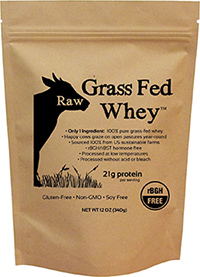
An ultra-high quality, organic whey protein that is low-temperature processed to maintain protein quality and nutrient absorbability. From pasture-raised, grass-fed, happy and humanely treated cows. Delicious, mixes easily in water and smoothies.
Getting Your Omega-3’s
Wild fatty fish (sardines, black cod, salmon, herring, mackerel, trout) are the most potent sources of omega-3s; eat at least two or three servings weekly. Plant sources—though less effective—include flax, hemp, and chia seeds (and the oils made from them), walnuts, pursuance, and pasture-raised eggs.
Omega-3 supplements can serve as backup and work best when taken daily, 1.5 to 5 grams of total EPA (eicosapentaenoic acid) and DHA (docosahexaenoic acid), which are the most efficiently utilized forms of omega-3s; taking them with some fatty food will help your body absorb them more efficiently and limit fishy burps. Most omega-3 supplements are some form of fish oil. Get a freshly made product from a quality manufacturer, store it in the fridge, and use it quickly. A strong fishy flavor or odor indicates rancidity. (Note that fish oil may interact with blood thinners.)
Conscious Lifestyle Recommends
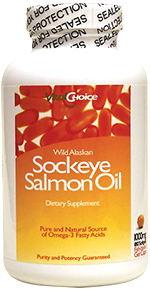 Vital Choice Wild, Cold-Pressed Alaskan Salmon Oil Capsules
Vital Choice Wild, Cold-Pressed Alaskan Salmon Oil Capsules
Hands down the worlds freshest, purest, most potent, best-tasting fish oil. Cold-pressed from fresh, wild Alaskan Salmon and free of all heavy metals, preservatives and adulterants. Exceptionally rich in naturally occurring Vitamin D (which is also extremely important for brain function and health).
In one study, Swiss researchers found that eating eggs for breakfast improved overall brain function and cognitive performance (and promoted healthy body weight).
Low Sugar
Even though glucose is the brain’s primary fuel, most of us eat too much sugar, which increases blood sugar levels, aggravates inflammation, and can worsen mood and brain health. Stick to low-glycemic foods and “slow burn” carbs from whole foods to optimize brain function and memory. See chapter 9 in my book for more details.
Eat Organic
Pesticide and herbicide residues are associated not just with poor memory and cognition but also with low acetylcholine levels, Alzheimer’s disease, reduced brain processing speed, and lower IQ. They pose the greatest risk for children and the elderly.
Key in on organic grains, dairy, and meat, and avoid the “dirty dozen” fruits and veggies to improve brain function and overall brain health (identified by the Environmental Working Group as the foods with the highest levels of pesticide and herbicide residues; see the EWG website for rankings).
Plenty of Antioxidants
Found in berries, veggies, beans, herbs, and spices—especially those with a vivid hue or flavorful aromatics—these compounds fight oxidative damage that can worsen brain function.
Pungent, Spicy Foods
Garlic, onions, hot peppers, and other pungent, spicy foods and herbs improve blood flow throughout the body, including the brain.
Lifestyle
When you exercise your body, you exercise your brain. No matter what your age or mental capacity, getting your body moving improves your brain function and adds years to your life span. Exercise stimulates your brain to produce more neurons, provides a positive challenge, and protects your neurons from damage.
Going from couch potato to cardio king increases brain volume and nervous system well-being in just 6 months. Exercise also balances neurotransmitters such as serotonin, norepinephrine, and dopamine that play a role in mood as well as overall function. Numerous studies find a correlation between activity level and healthy brain function in older adults. But you don’t have to be old to reap the rewards—high schools that encouraged students to take morning fitness classes found that test scores also improved.
Exercise helps your brain produce more brain-derived neurotoxin factor (BDNF), which is like Miracle-Gro for your brain. BDNF boosts structural growth, creates new neurons, improves signal strength, and prevents damage, all of which can help with day-to-day brain function, improve memory and cognition and reduce your risk of Alzheimer’s. The more you change up your fitness routine, learn something new, or introduce more complicated exercises, the better the results.
Exercise is essential for a healthy brain (and body!), but here’s another axiom to keep in mind: Use it or lose it. Using your brain—challenging it, testing it, learning with it—has been shown to prevent losses in memory and cognition. There are many, many ways to keep your brain actively engaged:
+ Meditate
+ Learn a new language
+ Play an instrument
+ Read
+ Take up an art or craft
+ Get some sun
+ Spend time in nature
+ Play
+ Get some culture
+ Improve your social connections
+ Volunteer
+ Spend time with animals
+ Do crosswords, games, puzzles—mix it up!
Mind-Body Balance
The importance of mind-body balance in attaining and maintaining healthy memory and cognition becomes obvious when you realize that meditation is one of the best-researched brain-boosting “remedies” around. Likewise, while some of our brain tonics improve “hardware functioning” by averting damage (oxidation, inflammation) and allowing delivery of adequate nutrients and removal of waste (circulation), others work on a higher level to improve brain function. Nootropic, nervine, and adaptogenic herbs help revitalize neurotransmitter and nerve function, promoting a better state of mind and improved memory and cognition.
Clearing The Cobwebs: What Drains Your Brain
No matter what herbs you take, also address the underlying cause of your brain fog. Here are some common cognitive pitfalls to sleuth out and address.
+ Sleep deprivation (during sleep, your body cleans up metabolic wastes and toxins in the brain that would otherwise contribute to Alzheimer’s disease and neurological disorders)
+ Poor diet: dehydration, excessive sugar, food allergies/sensitivities, bad fats, lack of key nutrients such as vitamin B12, omega-3s, or iron
+ Lifestyle: sedentary behavior, smoking, heavy metal or toxin exposure
+ Obesity
+ Stress
+ Menopause (stress and insomnia)
+ Poor circulation to the brain
+ Inflammation and oxidative damage
+ Pharmaceutical drug side effects
+ Diseases: attention deficit hyperactivity disorder, Alzheimer’s and dementia, diabetes and insulin resistance, heart disease, arteriosclerosis, hypertension, hypo- or hyperthyroid, anemia, Lyme disease and coinfections
You may also support some of these underlying issues with herbs for the brain and body as a whole. For example, you can use adaptogens or nervines for stress, sedatives for insomnia, digestive herbs to support dietary changes, circulatory herbs, anti-inflammatory or antioxidant herbs, and so on.
Mint-Family Memory Tonics
Several common mint-family garden herbs help keep your brain function young and improve memory and cognition. They notably inhibit acetylcholinesterase (AChE)—enemy number one in aging and Alzheimer’s—and they also have circulation-enhancing, antioxidant, anti-inflammatory, mood-boosting properties. Work them into your daily routine as tea, tincture, or food.
Lemon balm. Best known for its antianxiety and uplifting properties, lemon balm also improves the ability of acetylcholine—an important neurotransmitter that often declines as we age—to do its job. In one study, lemon balm improved cognitive performance and lengthened attention span. Improvements were seen in as little as one dose in 1 hour! And the higher the dose, the better the response. Use the fresh or recently dried herb for tea, or take a tincture. It blends well with holy basil, skullcap, bacopa, and milky oat seed, especially for improving attention while decreasing hyperactivity in children and adults.
Conscious Lifestyle Recommends
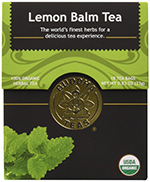 Buddha Teas Organic Lemon Balm Leaf Tea
Buddha Teas Organic Lemon Balm Leaf Tea
Premium-quality organic lemon balm leaves create a refreshing, tasty, brain activating and nourishing tea in convenient bleach-free tea bags.
Sage. Though perhaps better known as a seasoning for stuffing, sage potently inhibits AChE and has been shown to improve scores on word recall tests. Inhaling the aroma of Spanish or garden sage improves mood, cognition and overall brain function and memory. Due to sage’s thujone content, this herb is best used sparingly.
Conscious Lifestyle Recommends
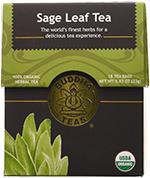 Buddha Teas Organic Sage Leaf Tea Bags
Buddha Teas Organic Sage Leaf Tea Bags
Premium-quality, highly fragrant organic sage leaves create a delicious, soothing brain and mood nourishing tea in convenient bleach-free tea bags.
Rosemary. In “seasoning” doses of around 750 mg, rosemary has been shown to improve memory recall speed in elderly patients. Simply inhaling the aroma of the herb or essential oil perks up the senses and significantly improves memory. High doses (around 6,000 mg) aren’t necessary and may even dampen memory.
Conscious Lifestyle Recommends
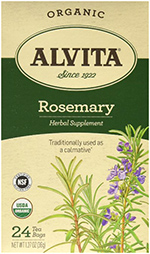 Alvita Organic Rosemary Herbal Tea
Alvita Organic Rosemary Herbal Tea
Premium-quality organic rosemary leaves create a refreshing, tasty, spiritually nourishing tea in convenient bleach-free tea bags.
Spearmint. Spearmint extract was shown in one study to boost memory, brain function and scores in cognitive tests designed to measure reasoning, attention, and planning, with some benefit seen within just 1 day. Attention and concentration scores more than doubled after 30 days, and reasoning scores improved dramatically, too.
Conscious Lifestyle Recommends
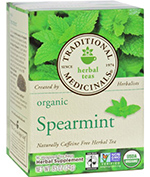 Traditional Medicinals Organic Spearmint Tea
Traditional Medicinals Organic Spearmint Tea
High-quality, fair trade, organic spearmint leaf tea for making memory-enhancing, refreshing herbal tea.
Peppermint. Peppermint essential oil, as aromatherapy, has been shown to improve many aspects of alertness and memory, including recall and reaction time.
Conscious Lifestyle Recommends
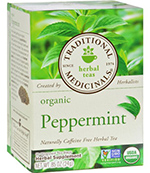 Traditional Medicinals Organic Peppermint Tea
Traditional Medicinals Organic Peppermint Tea
A refreshing, brain-activating blend of organic peppermint leaves in chemical-free tea bags.
Recipe: Mint Memory Medley
Enjoy the invigorating internal and aromatherapeutic benefits of these herbs as you sip! Also play with chocolate mint, apple mint, holy basil, culinary basil, sage, and lemon balm.
1 teaspoon peppermint
1 teaspoon spearmint
1 sprig fresh rosemary, or ½ teaspoon dry
1 teaspoon honey (optional)
Combine the herbs. Pour 2 cups boiling water over the herbs and let steep, covered, for at least 10 minutes. Strain, sweeten with honey, if desired, and enjoy.
Herbs to Improve Circulation and Reduce Oxidation and Inflammation
Your brain requires voluminous blood flow to function properly. Blood delivers essential nutrients, including oxygen and glucose; shuffles out waste; and transports hormones. Tiny blood vessels network throughout your brain, so microcirculation and the health and strength of those capillaries is crucial. Herbal cardiovascular tonics (see chapter 10 in my book), therefore, play a major role in preserving brain health.
Likewise, oxidation and inflammation really gum up the works, inhibiting blood flow and creating roadblocks in your neural roadways. Some damage may become obvious immediately, but long-term signs—including Alzheimer’s and dementia—take decades to accumulate and are revealed only in your elder years, when it’s more difficult to reverse the pattern. Scientists are just beginning to analyze inflammatory markers in the blood as early warning signs of cognitive damage and reduced brain function and the risk of developing dementia. Most scientific research keys in on the use of nonsteroidal anti-inflammatory drugs (NSAIDs), but herbalism offers us promising, safer natural solutions. Diet, stress, sleep, and exercise have the most profound effects on inflammation and oxidation in your body; however, several brain herbs—like the nootropic gotu kola and ginkgo, profiled below—may also provide targeted care.
Gotu Kola (Centella asiatica)
Key Properties: This Ayurvedic herb remains one of my favorites due to its impressive history of use in addition to a multitude of “side benefits” that apply to many. Indians have revered it as a memory and brain tonic for at least 2,500 years. Sanskrit texts claim that gotu kola juice will improve memory and intellect in just 1 week, and with long-term use, photographic memory and longer life span. Studies support gotu kola’s ability to improve mood and cognitive brain function while decreasing anxiety in the elderly, and it also improves circulation and blood vessel integrity, as well as the body’s ability to use glucose (the primary brain fuel) for energy when blood sugar levels are low. Indian children eat it when they go back to school.
Additional Benefits: Gotu kola also acts as a calm-energy adaptogen to relieve stress. It decreases anxiety without making you sleepy. It supports the health of connective tissues and the repair of tissue damage.
Conscious Lifestyle Recommends
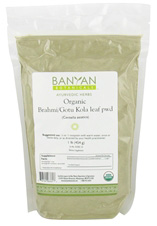 Banyan Botanicals Organic Gotu Kola Powder
Banyan Botanicals Organic Gotu Kola Powder
Ultra-high quality, fair trade, organic Gotu Kola grown and harvested sustainably by small farms in India. This is high-potency, bulk powder with powerful cerebral and brain function enhancing effects.
Preparation: Tea, tincture, capsule, juiced, powdered in smoothies, or as food. Standard herb doses apply. The leaves have a peppery flavor that easily blends with other herbs. Asian pennywort drink is made with this herb. Gotu kola and bacopa both go by the name brahmi, so when you’re buying, check the Latin name to ensure you have the right herb.
Cautions and Considerations: Generally safe for all ages, but it shouldn’t be used during pregnancy or nursing without supervision, may thin blood, and interacts with a few medications. Seek organic sources or grow your own; it naturally grows in sewage-sludgy conditions and can be contaminated with bacteria, including E. coli.
What Is a Nootropic?
Nootropics are “smart herbs” (or drugs) that improve memory, brain function, and intelligence.
General Uses: As brain tonics, these remedies help maintain and improve memory and cognitive ability while improving levels and function of neurotransmitters. Nootropics are typically reserved for brain concerns; however, they may also aid mental health and any condition that has a neural component.
Examples: Many Ayurvedic herbs work as nootropics, in particular bacopa, gotu kola, and holy basil, as well as rosemary, lavender, ginkgo, rhodiola, and, from the fungal world, reishi, lion’s mane, and cordyceps. Nervines and stimulants may also have value.
Ginkgo (Ginkgo biloba)
Key Properties: Ginkgo tops the best-seller charts for improving memory, and it has a particular affinity for the elderly and onset of dementia and Alzheimer’s. Traditional Chinese medicine has relied on ginkgo seeds for thousands of years, but the use of ginkgo leaves for memory is a new invention of European phytopharmacologists. Ginkgo has antioxidant, anti-inflammatory, and circulatory effects, boosting microcirculation to the brain. It decreases platelet aggregation (blood cell clumping); improves the way your brain uses glucose, oxygen, and ATP for energy; prevents strokes; and delays or improves the early stages of senile dementia. Though the research is mixed, it’s worth considering in the early onset of dementia and generally quite safe when used as a standardized extract. Though it may benefit younger, healthy people, I find the other herbs in this chapter more useful for them.
Additional Benefits: Ginkgo leaf extract tends to be used almost exclusively for improving memory, cognition and brain function. Although it can be used as a general antioxidant and circulation booster, other herbs like hawthorn and blueberry are probably more appropriate and useful. Some studies suggest that it alleviates symptoms of erectile dysfunction, age-related macular degeneration, and depression, but the evidence is preliminary and mixed.
Conscious Lifestyle Recommends
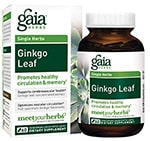 Gaia Herbs Organic Ginkgo Biloba Extract
Gaia Herbs Organic Ginkgo Biloba Extract
Premium quality, organic Ginkgo Biloba 20:1 ultra-high potency extract in highly bioavailable liquid phyto-caps. This is highly medicinal, versatile Ginkgo supplement with powerful cerebral and brain function enhancing effects.
Preparation: The standardized extract in capsules is best; follow the dosage instructions on the product label. The crude herb may be less effective and safe; however, you can harvest late-season yellowing leaves for tea and tincture, taking them in standard herb doses, or a bit less.
Cautions and Considerations: It may interact with some medications, thin the blood, and increase bleeding. The crude leaves contain mild toxins that are removed during standardization. You may experience a dull frontal headache, but this should pass with extended use.
Other Brain Herbs and Tonics to Consider
Turmeric, abundant in Indian and Okinawan diets, contributes to the incredibly low incidence of Alzheimer’s and dementia in those regions. In addition to supporting brain health with its potent antioxidant, anti-inflammatory, and circulation-enhancing properties, this bright yellow spice also helps keep beta-amyloid plaques from forming in the cerebral cortex. Turmeric has many other benefits, including liver protection, detoxification, improved digestion, antidepressant effects, and pain relief.
Conscious Lifestyle Recommends
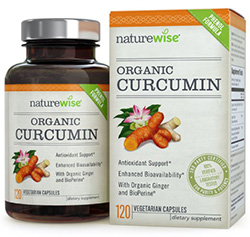 Organic Curcumin with Piperine Extract
Organic Curcumin with Piperine Extract
A highly absorbable and bioavailable Organic Tumeric (Curcumin) extract, free from preservatives, artificial colorings, soy or stearates.
Berries, and especially blueberries, may be one of our most delicious brain foods! The Tufts Human Nutrition Research Center on Aging and other research centers have performed a slew of studies demonstrating blueberries’ ability to reverse age-related mental decline, reduce symptoms of Alzheimer’s, and enhance cognition and improve memory, including word recall and associate learning. The potent antioxidant and blood-sugar-balancing effects of the berries surely help, and other berries offer similar benefits.
Conscious Lifestyle Recommends
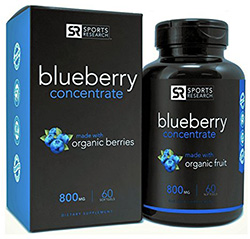 Organic Wild Blueberry Concentrate
Organic Wild Blueberry Concentrate
An ultra-high quality, antioxidant rich organic wild blueberry concentrate, free from preservatives, fillers, artificial colorings, soy or stearates.
Green tea, well known for its antioxidant content, has been shown to reduce the risk of dementia and mild cognitive impairment in the elderly. For healthy adults, green tea improves brain function, activity and working memory and scores on cognitive tasks. Researchers suspect that green tea improves the “effective connectivity,” or how well one area of the brain can connect with and influence another. Japanese researchers testing elderly patients with mild to severe dementia found that those who supplemented with green tea extract (equivalent to 2 to 4 cups of tea daily) for 3 months had improved dementia assessment scores and short-term memory. Green tea also has many other benefits, including improved mood, increased energy, decreased inflammation, weight loss and better metabolism, and reduced blood sugar.
Conscious Lifestyle Recommends
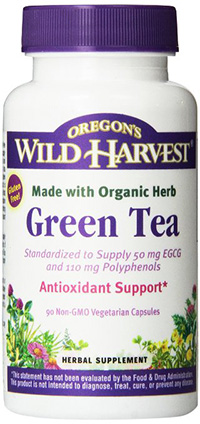 Organic Green Tea Extract
Organic Green Tea Extract
An ultra-high quality, organic green tea extract rich in polyphenols, catechins and ECGC for maximum brain performance and cognitive enhancing effects. Cold-water extracted to preserve sensitive compounds in the tea leaves.
All the brain herbs we’ve discussed so far are excellent for promoting brain health, but any herb that offers circulation support and anti-inflammatory effects will, as a happy side effect, promote healthy brain function. With that in mind, consider adding herbs such as hawthorn, garlic, ginger, black pepper, cacao, and cayenne—in fact, most culinary herbs and spices—to your blends and daily diet.
Herbs For Reducing Stress and Mental Fatigue
Chronic and acute stress degrade your memory, especially if sleep deprivation enters the mix. So it’s not surprising that most of our stress-relieving adaptogens do double-duty as brain function tonics.
Bacopa (Bacopa monnieri)
Properties: This Ayurvedic creeping water plant shares the name brahmi with gotu kola. Bacopa improves memory and focus, slows the progression of Alzheimer’s, and promotes recovery from brain trauma. Though it has a long history of use, studies have yielded only moderately enthusiastic results. It seems to work best at improving retention of new information, regardless of age or mental capacity. Bacopa is known for its ability to calm without sedating. It blends well with gotu kola, holy basil, lemon balm, ashwagandha, and milky oat seed. It works best for improving brain function when taken regularly for months at a time.
Additional Benefits: Bacopa is also used as a nervine and adaptogen for anxiety, depression, and hyperactivity (including attention deficit hyperactivity in children and adults).
Conscious Lifestyle Recommends
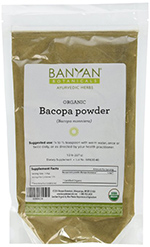 Banyan Botanicals Organic Bacopa Monnieri Powder
Banyan Botanicals Organic Bacopa Monnieri Powder
This medicinal quality organic Bacopa powder is a powerful brain function, mind and nervous system rejuvenator. Ethically sourced from small, fair trade family farms in native regions of India.
Preparation: Tincture or capsule. Try it in tea blends, but it can get bitter. Standard herb doses apply. Some companies sell both bacopa and gotu kola as brahmi, so check the Latin name to know which you’re buying. Various bacopa species are available as aquarium and garden plants; however, only one species appears to be useful for brain health.
Cautions and Considerations: No major known issues. It’s even used for children. If it upsets your stomach, take it with food.
Other Stress-Relieving Brain Tonics
Other anti-stress herbs that improve brain function include gotu kola, lemon balm, holy basil, ashwagandha, and reishi. Rhodiola is another. In contrast to the calm-energy effects of bacopa, it provides a zippy physical and mental energy boost, and it works quickly. It seems to protect and may help regenerate nerves. The herb also protects against cognitive deficits, oxidative stress, and inflammation, among other nerve and brain benefits. In highly stressed women, it has been shown to improve attention, speed, and accuracy during stressful cognitive tasks. I’ve seen great results using rhodiola for menopausal brain fog; the ladies love it! Rhodiola also improves ATP synthesis, which boosts energy on a cellular level, and it increases stamina while decreasing fatigue.
Other stimulating adaptogens that support the brain and memory include ginseng, eleuthero, cordyceps, jiaogulan, and codonopsis. See chapter 3 in my book for more about these and other adaptogens that improve brain function.
Repairing Brain Damage & Activating Neural Regeneration
Traumatic accidents and diseases like Lyme and multiple sclerosis can physically damage nerves and brain function. No matter what the conventional approach, you can often improve your recovery with the support of special brain herbs, diet, and holistic lifestyle choices. Keep the general brain-supportive diet and lifestyle tips from this article in mind, and also limit your intake of caffeine and stimulants—they tend to agitate and worsen symptoms. The following brain herbs may also help your brain heal and restore memory and cognitive function. Don’t forget to give yourself time to rest and heal; try not to push yourself to take on more than you can handle.
Lion’s Mane (Hericium erinaceus)
Key Properties: This mushroom helps nerve cells regenerate, something generally considered impossible. Preliminary yet impressive research suggests that it contains nerve growth factors that help stimulate nerve growth, heal nerve damage, improve brain function and cognition, and fight dementia. In a small study, 30 older Japanese men and women who took 3 grams of powdered lion’s mane (in capsules, divided up throughout the day) performed significantly better on cognitive tests at 2, 3 and 4 months compared to the placebo group. Unfortunately, the benefits diminished once the treatment ended, so you will need to continue taking it, at least in the face of dementia. Clinically, herbalists are seeing good results with lion’s mane tinctures and capsules for clients with disease or trauma-related nerve damage. They also report good results with other Hericium species.
Additional Benefits: Although lion’s mane and its Hericium relatives have become recently famous for their nerve- and cognition-enhancing effects, these bright white, tender mushrooms are primarily known as gourmet edibles. When sautéed in butter, they offer a flavor and texture akin to lobster or crabmeat. In traditional Chinese medicine, lion’s mane is used for healing digestion and ulcers as well as a nerve and general tonic.
Conscious Lifestyle Recommends
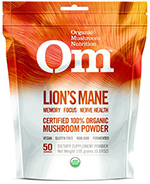 Om Organic Lion’s Mane Mushroom
Om Organic Lion’s Mane Mushroom
Ultra-pure, organic lion’s mane medicinal mushroom powder containing high levels of Nerve Growth Factor (NGF) and other brain function enhancing compounds and nutrients.
Preparation: Studies used 3 grams powdered, in capsules, divided throughout the day. You can also try it in food or as a tincture or tea, in standard herb doses.
Cautions and Considerations: None known, but information about this mushroom is new. However, it has a long history of safe use as food. In cases of dementia, you must continue to take it to maintain the results.
Other Herbs to Support Nerve Repair
Reishi mushroom also offers restorative, neuro-protective effects and has long been regarded as a mushroom of longevity and immortality.
Conscious Lifestyle Recommends
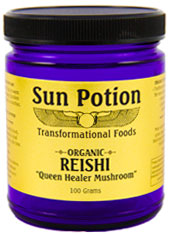 Sun Potion Organic Reishi Blend
Sun Potion Organic Reishi Blend
Ultra-pure blend of four different species of Reishi (red, white, black and purple) to create a full-spectrum mycoproduct cultivated under strict, organic protocols in the USA. Specially processed using enzymes that increase the body’s and brains ability to absorb the powder and incorporates whole extracts from the mushroom at all stages of its life cycle.
Shiitake helps release or activate a compound called beta-secretase 1 (BACE1) that breaks down beta-amyloid plaque associated with brain aging and Alzheimer’s. Cook or use hot-water extraction for these mushrooms.
Used internally and externally, St. John’s wort may heal nerve damage and encourage healthy nervous system function. It appears to soothe irritation while promoting healing. Regularly apply infused oil or liniment topically to areas of injury. For improving brain function and memory support, take as a tincture, capsule, or tea. Herbalist David Winston combines it with ginkgo, bacopa, and holy basil for brain trauma and injury. A nice red hue in St. John’s wort remedies is a good indicator of potency. Internal use of St. John’s wort interacts with many medications and, in rare cases, can make fair-skinned people extra sensitive to the sun.
Conscious Lifestyle Recommends
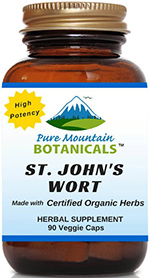 Pure Mountain Organic St. John’s Wort Extract
Pure Mountain Organic St. John’s Wort Extract
Medicinal quality, full-spectrum, high potency St. John’s Wort extract in convenient vegetarian capsules. Wildcrafted, freshly harvested mood and cognitive enhancing formulation that is free of additives and binders in a recyclable glass jar.
More brain herbs that help restore nerve function to consider for your formula include gotu kola, bacopa, holy basil, rhodiola, hawthorn, rosemary, milky oat seed, and ashwagandha. Also consider aromatherapy and flower essences.
Recipe: Brainiac Bonbons
These tasty treats are a medicine and an energy snack in one. Depending on the brain herbs you choose to use, you will get a good dose of antioxidant, brain-tonic, and adaptogenic herbs in each bite. Use this recipe as a guide, and feel free to play around with the herbs to find the combination that works best for your health and taste buds. For added decadence, you may want to dip the bonbons in melted dark chocolate (let cool on wax paper or in mini muffin cups in the fridge).
²∕³ cup almond butter
¹∕³–½ cup honey
3 teaspoons powdered herbs: any combination of ashwagandha, maca, gotu kola, holy basil, hawthorn berry, cocoa powder, pinch of bacopa (it’s bitter)
Toasted sesame seeds, unsweetened coconut flakes, or cocoa powder, for rolling
Combine the almond butter, honey to taste, and herbs in a bowl, and mix well. Roll into small balls (about 1 teaspoon each). Roll each ball in your topping until well covered. Store in a tightly sealed container. They’ll keep for a few weeks at room temperature, or slightly longer in the fridge or freezer. Enjoy one or two a day.
The article on how to improve brain function and memory with herbs and foods is excerpted from Body Into Balance: An Herbal Guide to Holistic Self-Care by Maria Noel Groves.
About The Author
Maria Noel Groves, RH (AHG) is a clinical herbalist based in Allenstown, NH. She achieved certification through study with Michael Moore at the Southwest School of Botanical Medicine. She also completed Rosemary Gladstar’s Science and Art of Herbology home study course, as well as Rosemary’s advanced herbal program on site at Sage Mountain. Maria began her herbal studies with Nancy Phillips’ Foundations Course at Heartsong Farm. Maria has nearly two decades of experience in herbs and is a registered professional member of the American Herbalists Guild. She opened her full-time practice in 2007. Before 2007, she worked under her maiden name, Maria Noel Mandile. Visit her website: wintergreenbotanicals.com







